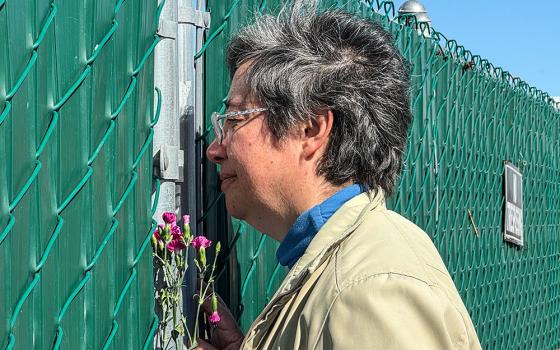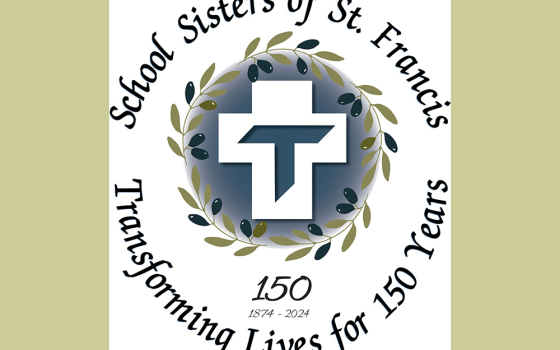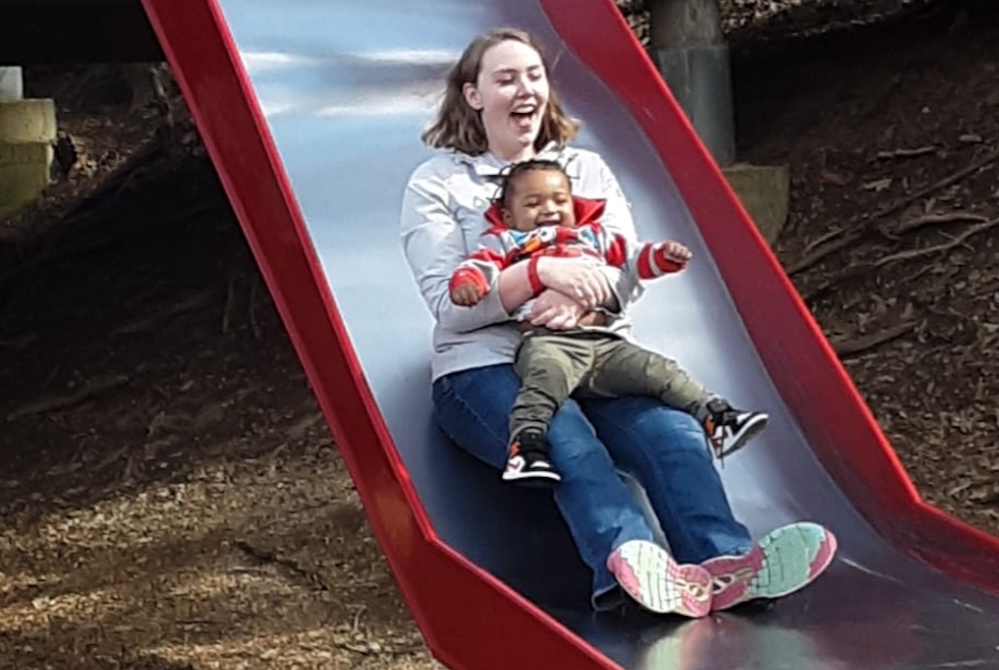
Mary-Teresa Robinette, Change a Heart Franciscan Volunteer Program volunteer, joins a child from Angels' Place in Pittsburgh on the slide in March 2020. (Provided photo)
When Maureen Geglio volunteered with the Sinsinawa Dominicans as a teacher on Chicago's South Side during the 1980s, she had just finished college. Nearly 40 years later, she decided the time was right to leave a career in education and administration in Grand Rapids, Michigan, to volunteer again with Dominican Volunteers USA.
The COVID-19 pandemic has wrought some major changes to her experience. For starters, she arrived in August at the Racine Dominicans' Eco-Justice Center in Wisconsin, to spend two weeks quarantining in a hermitage on the property. "It was wonderful, and extremely difficult," Geglio said.
The hermitage was cozy, yet she admitted to being lonely. Wi-fi wasn't accessible, and to get a signal on her phone, she had to walk to a barn some distance away.
She then moved into a red farmhouse on the grounds with the four sisters, who work to do everything green, including cultivating an extensive garden, selling the produce at a farm stand, raising alpacas, and showering love on Rosie the goose. Geglio related her grown son's reaction: " 'It sounds like you're living with a bunch of hippies.' "
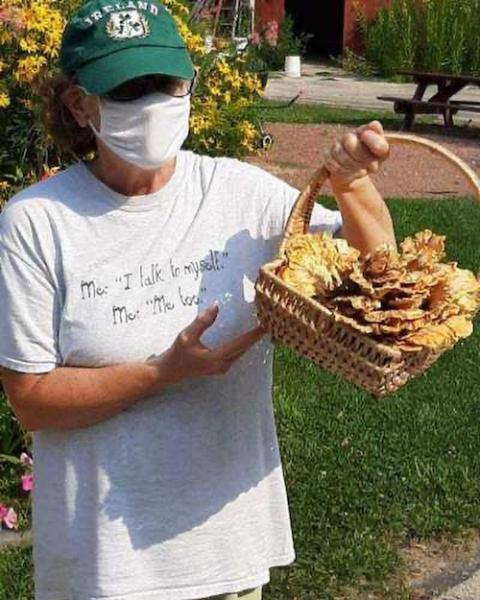
Dominican Volunteer Maureen Geglio shows off "hen of the woods" mushrooms, locally grown at her ministry site, the Eco-Justice Center, in Racine, Wisconsin in September 2020. (Provided photo)
She doesn't mind the label, even if advocating for environmental justice and pulling weeds requires wearing a face mask and washing her hands more often than usual to prevent the spread of COVID-19.
Since the onset of the pandemic, altering their full-time volunteer programs has been a major adjustment for many women's religious communities to protect elderly and vulnerable sisters from the virus. The challenge has been met by sisters willing to adapt and volunteers willing to continue serving, while taking precautions to keep themselves and others safe.
Dominican Volunteers USA
Danielle Porter decided to apply for the Dominican Volunteers USA after learning about it during her years studying theology, philosophy and legal studies at Aquinas College in Grand Rapids, Michigan. The daughter of Haitian and Jamaican immigrants, she wanted to be an advocate for refugees and immigrants.
She sent in her application in late 2019, before coronavirus became a consideration. As things changed early in 2020, Porter still managed to travel to Ireland as part of her studies. She was accepted into the volunteer program late in the spring.
Normally her service would have begun by traveling straight to her ministry site in August. She instead started with a two-week quarantine and daily temperature checks. The three Adrian Dominican sisters with whom Porter would live in Detroit were comfortable with her quarantining at home in Chicago, said Megan Rupp Ugolino, Dominican Volunteers USA executive director.
"I kept a log of the time I was quarantining and did a questionnaire every day," Porter said. Her health clear, she traveled to Detroit, where she serves at All Saints Literacy Center tutoring adult English language learners and native speakers who need literacy support.
Living in community, Porter joins Srs. Ginny King, Nancyann Turner and Janice Brown for prayer during the week. Some nights, "We do eat dinner together around the TV, watching the news and talking about our days," she said.
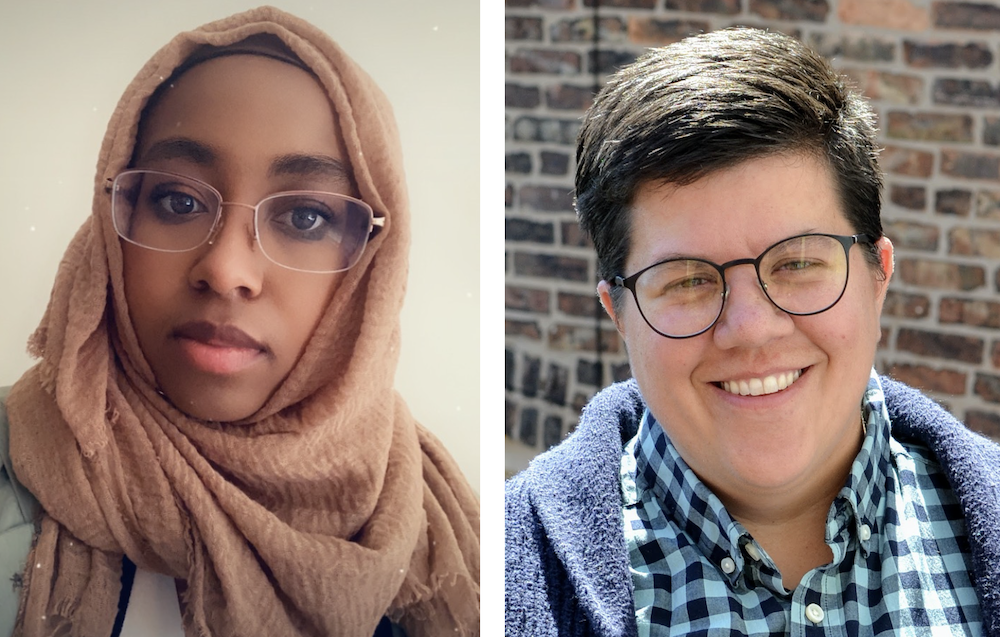
Left: Danielle Porter, Dominican Volunteers USA volunteer; Right: Megan Rupp Ugolino, Dominican Volunteers USA executive director (Provided photos)
Because the sisters are older, Porter is very careful about protecting them from contracting COVID-19, especially maintaining social distance. "I do take regular temperature checks still. I do wash my hands after I come back from my ministry site and keep my immune system up by taking vitamins and drinking lots of water," she said.
Trying to stay vigilant, Porter also uses hand sanitizer and disinfects the items she takes with her to the ministry site, from her backpack to pens and pencils.
Dominican Volunteers serve across the U.S., the result of a 2001 merger of regional programs coordinated by sisters, priests and brothers into a national Dominican-sponsored organization. Nonprofits that partner with Dominican Volunteers USA had to be consulted about their availability to host applicants during the pandemic, Ugolino said. When arranging placements for the six volunteers serving for the 2020-2021 year, it didn't prove feasible to place them at some sites because of COVID-19.
Another change occurred when Sinsinawa Dominincan Sr. Marilyn Derr, who had spent 30 years living in community at the House of Connections — the former convent of Blessed Sacrament Parish in Chicago — with the volunteers serving in Chicago, decided not to share the building with volunteers. Instead, the two volunteers currently serving at sites in Chicago are sharing housing with two former volunteers.
The prospect of worrying about the volunteers and whether they were safe in the midst of the COVID-19 pandemic played a large role in her decision. "It was so painful thinking that I wouldn't be able to say yes to the volunteers living with me here this year," Derr said.
She doesn't invite even the sisters from her own community into the house. "We visit on our porches or in the back yard," Derr said.
Technology provides Derr continued contact with the volunteers. Each Thursday, a Zoom meeting allows the group to share prayer and community. Zoom and similar video chat programs have become an asset in keeping sisters and volunteers in touch when they can't meet in person, Ugolino said, noting. "We are folding our Dominican sisters into community support in different ways."
She acknowledged that this year has sparked extensive discernment about how the program will look going forward.
Ugolino sees the importance of continued interaction between religious and volunteers. "It's very life-giving for everyone involved. The sisters stay engaged, and the volunteers see their life-long commitment to service."
Advertisement
Benedictine Volunteers Program
Several Benedictine women's communities offer live-in volunteer programs, which the pandemic disrupted in different ways.
Mount St. Scholastica, Atchison, Kansas; Sacred Heart Monastery, Yankton, South Dakota; and Mount St. Benedict Monastery, Erie, Pennsylvania, are among those that have posted the closing of their buildings to visitors and retreatants on their websites.
St. Scholastica Monastery, Boerne, Texas — which partners with Annunciation Monastery, Bismarck, North Dakota, in the Benedictine Volunteers program — phrased their closing poignantly: "Benedictines hold as one of their most precious values Hospitality. It is with deep regret and a sense of sadness that we cannot welcome visitors during this crisis."
The Benedictine Volunteers program started as a collaboration of three monasteries in 2014, with the Boerne and Bismarck monasteries still actively participating. Volunteers from 20 to 58 years old are welcomed for periods ranging from two weeks to two years, living within the monastery and sharing in the life, prayer and ministry of the three dozen sisters.
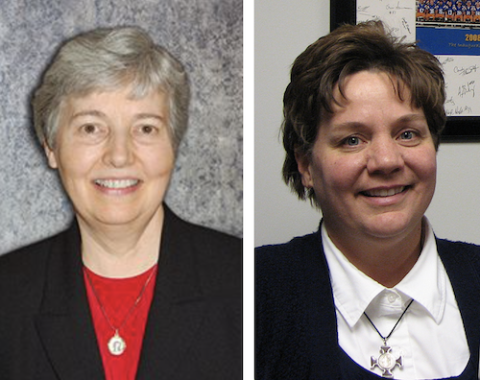
Left: Sr. JoAnn Krebsbach, co-director, Benedictine Volunteers; Right: Sr. Lisa Maurer, vocation director, St. Scholastica Monastery, Duluth, Minnesota (Provided photos)
At Annunciation Monastery, one volunteer continues to serve during the pandemic, said Benedictine Sr. JoAnn Krebsbach, co-director of the Benedictine Volunteers program.
That volunteer would normally be working at Ministry on the Margins, which provides
food, clothing and friendship to people in transition, including individuals re-entering the community after incarceration, Krebsbach said.
"There's not enough work there with COVID, so she is working at the monastery," Krebsbach added, doing whatever is needed in the library, garden, kitchen or answering the phone.
When the current volunteer's second year of service ends in April 2021, it's uncertain if Annunciation Monastery will accept other live-in volunteers, Krebsbach said. "Our plans are not to accept any future volunteers without Ministry on the Margins doing more."
Two live-in volunteers were serving at St. Scholastica Monastery, Duluth, Minnesota, with more than four dozen sisters of all ages when COVID-19 raised concerns, said Benedictine Sr. Lisa Maurer, vocation director.
As Maurer recalled, "When I saw the writing on the wall and learned about pandemic-related shut-downs in the state, I approached the volunteers, asking whether they wanted to be caught on the inside or the outside" of the monastery during the stay-at-home restrictions.
One woman decided to remain. "She continues to be a true blessing to us," Maurer said of how she picked up the slack when local volunteers could no longer come to the monastery to help in the garden or drive sisters to appointments.
While the live-in volunteers would normally visit older sisters in the assisted living section of the monastery called Benet Hall, or accompany them to doctor or dentist appointments and on other errands, a top priority became answering the phone at the information desk, Maurer said, because people continued to call frequently with prayer requests and questions about the closure.
"She's kind of filled in where we've needed it," Maurer said.
Change a Heart Franciscan Volunteer Program
A faith-based volunteer program in southwestern Pennsylvania, Change a Heart Franciscan Volunteer Program brings young people between the ages of 21 and 30 from all over the country to the Pittsburgh area to serve children, youth, adults and seniors in the areas of education, health, nutrition and various social services.
The disruption caused by COVID-19 might have sent many people into a panic, said Patricia Moran, Change a Heart Franciscan Volunteer Program director. When she approached the five volunteers in the program as restrictions were put in place, they all opted to stay and continue their service. "It was impressive," Moran said.
Some of the volunteers' duties changed, Moran added, due to the restrictions. Discussions were held with the organizations where volunteers were placed to determine how they could serve clients going forward.
"The service sites have all made adjustments," Moran said. In some instances, that meant not going out to the streets to work with the homeless population, or meeting via the internet, instead of in person, to provide resources for young mothers. Especially challenging was dealing with school children in underserved areas who did not have access to computers or the internet, Moran said.
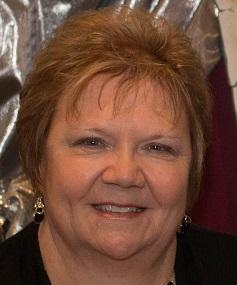
Patricia Moran, Change a Heart Franciscan Volunteer Program director (Provided photo)
"We put parameters in place for keeping the volunteers safe," Moran said. That included providing them with masks, hand sanitizer and disinfectants. It also meant being considerate of the other volunteers in the house after using public transportation to travel to and from the ministry sites. "Everyone has been very vigilant," Moran said.
The Sisters of St. Francis of the Neumann Communities founded Change a Heart Franciscan Volunteer Program in 1999. The 55-acre motherhouse in Pittsburgh allowed for volunteers to interact with the sisters on a frequent basis, including retreats at the large facility, Moran said.
"Some of the volunteers have never met a nun, or know what the lifestyle of a nun is," Moran said.
When the sisters sold their property two years ago, those remaining in the area moved into a senior living center, where the volunteers were previously able to visit them throughout the year.
With COVID-19, that has changed, Moran said. Now, the volunteers reach out to the sisters via Zoom, phone, email or letters. "The sisters miss the visits tremendously," Moran said. "They get to see how their charism is continuing in the city through these young people."
Each volunteer has a prayer-sister, as well, connecting on a regular basis.
Mary-Teresa Robinette, in her second year with Change a Heart Franciscan Volunteer Program, cherishes the connection with her prayer-sister. "It's a real friendship, but also they pray for us."
Originally from Tacoma, Washington, Robinette applied to the Change a Heart program after serving with two other full-time volunteer organizations after her high school graduation.
"When I came into the program, I didn't know what I wanted to do with my life," Robinette said. "I've seen a lot of personal growth in myself."
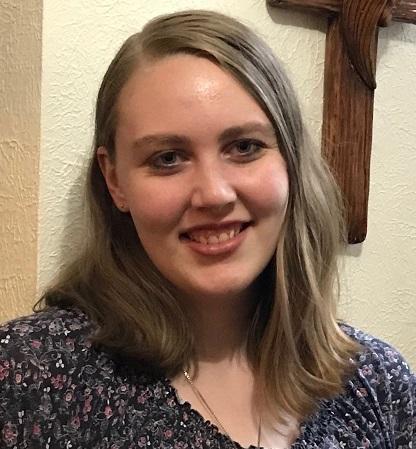
Mary-Teresa Robinette, Change a Heart Franciscan Volunteer Program volunteer (Provided photo)
She credits the sisters and the other volunteers, with whom she lives in a modest house, with helping her gain more self-confidence and become a better advocate for herself. Robinette serves as a co-teacher for toddlers at Angels' Place, which provides low-income single parents who are full-time students with assistance to complete their education.
She, like Porter and others who have participated in full-time or live-in volunteer programs sponsored by women's religious communities, has considered a religious vocation, but ultimately decided her vocation lies elsewhere.
At the end of her service with the Dominican Volunteers USA, Porter will most likely resume her studies in graduate school, she said.
Robinette has already been offered a permanent position at Angels' Place when she completes her second year as a volunteer, affirming Moran's data that 80% of Change a Heart Volunteers remain in Pittsburgh after their service.
"You never know what God calls you to," Robinette said.
As the sisters provide examples to the volunteers, the volunteers also inspire the sisters. COVID-19 has impacted life in some negative ways, but Derr, the Dominican sister in Chicago, remains hopeful. "It's a really remarkable thing that, despite the changes, the volunteers still want to do this."
[Julie A. Ferraro has been a journalist for more than 30 years, covering many topics for publications across the U.S. She currently lives in Yelm, Washington.]



